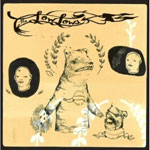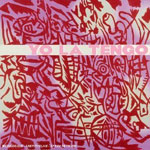

In the same sort of sphere are Glasgow's The Poems and their Young America record on Minty Fresh Records. While it contains all the hallmarks of every Glasgow pop album ever, it does separate itself nicely with its own inimitable line in weariness and lyrical maturity that is vaguely reminiscent of The Lucksmiths' defiance and Belle & Sebastian's arch knowing. But when The Poems do it, they stick enough age and heartbreak in there to make it seem like someone else entirely. Having said that, when I first put it on I couldn't stop thinking 'Camera Obscura are the new Scottish band to rip off', but that faded after you realise that the graceful lyrics on Young America are not the domain of those particular heartbreakers. They are more ragged, more bitter and a darn sight more affecting than most (but not quite as good as Belle & Sebastian just yet… give 'em time). It all emanates from age and experience, something that beginners have no hope of procuring in quite the way The Poems do. Like their literary title (hang on… My Latest Novel… The Poems… this is getting interesting), they thrive on heartache an ageing disgracefully. This experience is lined with the stupidity of emotional regression, being in a place where it is impossible to make your feelings mature at the same rate as your body. This is a noble and engaging subject for art, no matter its medium.
Whilst trying not to look too drunk at the Fortuna POP! birthday bash the other week I ran into Amos, the drummer from Tompaulin. He now drums for Darren Hayman and for some other bands as well, two of which being Electric Assembly and Silver Springs – the contents of a sampler CD that he kindly gave me. Electric Assembly are ace, like a very intense and tiny Pink Floyd draped across My Bloody Valentine's clotheshorse. Or auf Englisch, it's a cunning mesh of acoustic trickery and watery noises over some obscenely delicate drumming. It's top. Silver Springs are the darkest and slipperiest country nightmare imaginable, full of deliriously entertaining and bouncy melodies flopping all over the place as if they were written before anyone even picked up a guitar.

Enough country and pop. Let's get psychedelic. The ever-reliable Acid Mothers Temple have come up trumps again with their batty new record with some people called The Melting Paraise UFO. The whole thing is titled Have You Seen The Other Side Of The Sky (on Ace Fu Records), obviously. More than that, the whole ensemble features members of The Boredoms and Gong, among various other Japanese experimentalists. As soon as it whirs into life with noises that sound like a bubblejet on speed, you know you're in for a good time. And when the drums and bass and guitar riffs taken from Satan's digestive tract, the floor begins to shake. And hell, even better than that, when the flutter-tongued jazz-flute kicks in, you know that you may as well not leave the house for a day so you can get over this heroin-hit of a record. A glance at the inlay tells us that enigmatic AMT leader Makoto Kawabata is the 'speed guru'. Hmm. Doesn't stop it from being an absolute shit-kicker of an album. The closing riff of the album, on a track called 'The Tails Of The Solar Sail – Dark Stars In The Dazzling Sky', is as crushingly brilliant and intense as rock music can be. It is pared down to one furious riff and shorn of all excess, and then splattered all across the face of it are some utterly delirious guitar solos and sounds that can only have come from an underground Japanese bunker during the war or something. It is the sound of death coming towards you with a smile on his face and Edvard Munch's 'The Scream' as his screensaver. It is stupid and scary and hilarious and brilliant all at the same time. And that’s probably quite tricky to do.
While we're being psychedelic, it seems timely to mention
a compilation I snaffled off a colleague over at Indie Workshop from
a series called Love, Peace and Poetry. It's the African Psych
volume, featuring beautifully skewed and rattling songs from enchantingly
named artists such as Otis Waygood and Suck. If I had a name like Otis
Waygood I wouldn't have to worry about enticing the laydees, I'm sure.
But either way, Waygood is a definite standout here. His 'Ten Light Claps
And A Scream' is a hilariously monikered but beautifully paced one hundred
seconds of lovely aesthetics and not-quite-waltzing stop-start difficulties,
but a joy for its duration. Likewise, Rikki Llionga's 'Sunshine Love'
is a nod-worthy funk orgasm with some great wah-work and a frankly hilarious
monologue detailing a very particular kind of love: 'y'know, the kind
of love that tickles you down to the toes…' Man, I should memorise
this stuff and use it down the discotheque.
The compilation itself is a glorious
testament to the way pop music spreads out from the West and gets localised
and almost made indigenous again, depending on where it ends up. Having
previously gotten into the Latin American side of things (conclusions:
Argentinean emo and hardcore are seriously intense due to political flare-ups,
and Brazilian cidade hip-hop is proper incendiary), I now pledge to get
some music from more varied corners of the earth from henceforth. This
African Psych collection is merely the starting point. 'Battle Hymn Of
The Broken-Hearted Horde' by Freedoms Children is ingeniously constructed,
appearing initially to be a gorgeously plaintive wonderer, but it soon
turns into a demonic Batman sound-alike before turning inside out again
and leaving us with a shell of the same pretty tune we were greeted with.
Quite simply, this is music for an afternoon in Johannesburg when Eugene
Terreblanche isn't looking. He wouldn't like it anyway; all his albums
are spoken-word.

Probably the most anticipated release for me in recent months is Yo La Tengo's new LP, that one with the stupid long title. While everyone else has been declaring it a massive return to form and a complete triumph that defines the band consummately, I think it's something simpler than that. Yo La Tengo don't care what any of us think, so what's the point of proclaiming this record a startling regaining of past momentum? The concept of being 'on form' doesn't really apply to Yo La Tengo, they just seem to exist in a space hallowed by the music industry labelled 'Those We Cannot Touch'. Every release is bound to be a classic in the eyes of aficionados, so why bother reviewing it? I don't know. But we all do anyway.
I Am Not Afraid Of You And I Will Beat Your Ass (Matador Records) is, of course, utterly superb. Sprawling into life and stabbing you in the face with the confusing riff of 'Pass The Hatchet I Think I'm Goodkind', Yo La Tengo don't ever really look backwards. When the ten minutes of that are over and done with, it's pop, pop, pop till the end. Beanbag Chair, as those who are familiar with the concept known as 'stealing songs off Matador's Website' will know, is full of trombone and piano plonks with a criminally catchy chorus about, well, smashing a Beanbag Chair. And then from the romantic matinee bounce of 'Sometimes I Don't Get You' to the compulsively lovable closing soundscape of 'The Story Of Yo La Tengo', it is every inch the work of confident musicians at the top of the game. Writing that makes me feel like I'm assuming some sort of authority over Yo La Tengo, and that’s impossible because they're pretty much bulletproof when it comes to critics. They exist in a space that no one else can really get to. And that's all a band should strive for, isn't it?